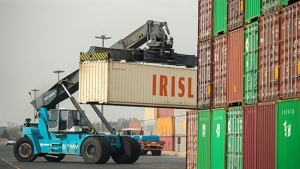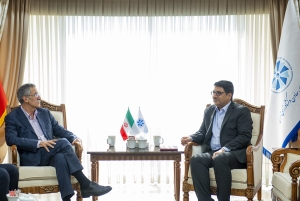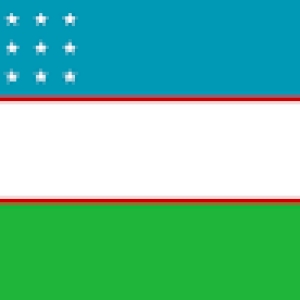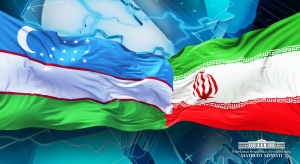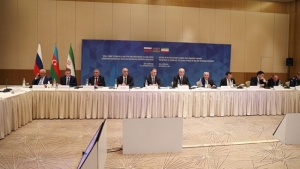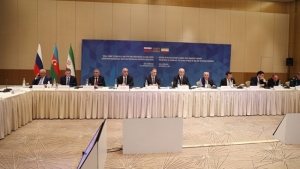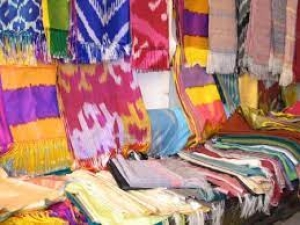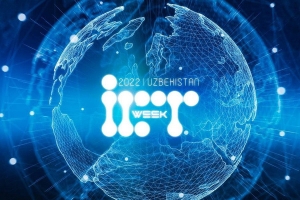ecocci
Iran’s five-month exports to ECO states grow by 40% YOY
The value of Iran’s exports to the Economic Cooperation Organization (ECO) member countries grew by 40% year-on-year during the first five months of the fiscal year (March 21 – August 22), according to the spokesman of Iran Customs Administration.
Rouhollah Latifi said on Tuesday that Iran exported some 7.3 million tons of goods worth $4.1 billion to the nine-member bloc in the period under review.
The official put Iran’s total trade with ECO member countries at 9.1 million tons ($6.89 billion), which he said is up 39% compared to figures from the corresponding period of the preceding year without mentioning whether this growth was in terms of weight or value.
According to Latifi, Iran’s imports from the organization member countries stood at 1.79 tons. Despite a 2% fall in terms of weight, Iran’s imports register a 38% hike in value terms.
Turkey, Afghanistan, and Pakistan were the top three destinations for Iranian commodities among ECO member countries during the five-month period with Turkey, Pakistan and Kazakhstan being the main importers to Iran during the time span, the spokesman said.
Ways of expanding trade with Pakistan explored at TCCIMA meeting
TEHRAN - In a meeting between Consulate General of Iran in Karachi Hassan Nourian and Head of Tehran Chamber of Commerce, Industries, Mines and Agriculture (TCCIMA) Masoud Khansari, the officials discussed ways of expanding trade relations between Iran and Pakistan, the TCCIMA portal reported.
In this meeting, which was held at the place of TCCIMA on Monday, important issues such as the unfamiliarity of the businessmen of the two countries with the production capabilities, goods and services of each other, the existence of some communication and commercial monopolies, the decrease in the number of business delegation exchanges due to the pandemic, and the need for cooperation in holding exhibitions as well as more attention to border crossings were raised and discussed.
Referring to the volume of trade between Iran and Pakistan, Nourian said: “Informal trade between the two countries is large, and many Iranian products are traded in the Pakistani market using national currencies; trade through third countries and even smuggling also takes place, and it is estimated that the actual trade between the two countries is much higher than what is recorded in the official statistics.”
“For a long time, establishing a barter trade mechanism between the two countries has been discussed for developing mutual trade, and in this regard, a memorandum of understanding has also been signed between Zahedan Chamber of Commerce and Quetta Chamber of Commerce and Industry, but nothing special has happened in terms of implementation, and it seems that more focus and effort should be put on this issue,” the official added.
Referring to the holding of an exhibition in Karachi in late December, Nourian called on the Iranian chambers of commerce to make the necessary arrangements for the maximum presence of Iranian companies in this event.
Khansari for his part stated that TCCIMA will take the necessary measures to ensure the presence of private sector companies in the Karachi exhibition.
He further noted that TCCIMA is going to send an official invitation to Karachi Chamber of Commerce to send a business delegation to Tehran.
Photo: TCCIMA Head Masoud Khansari (L) and Consulate General of Iran in Karachi Hassan Nourian
12th International Exhibition on the Industry of Plastics and Polymers – Plastex Uzbekistan 2022
The President of Iran to Pay an Official Visit to Uzbekistan 12.09.2022
On September 14 - 16 this year, at the invitation of the President of the Republic of Uzbekistan Shavkat Mirziyoyev, the President of the Islamic Republic of Iran Ebrahim Raisi will pay an official visit to our country.
The Uzbek-Iranian top-level talks and other events of the visit program will be held in Samarkand.
It is envisaged that the leaders will consider the issues of further development and strengthening of multifaceted relations between the two countries, as well as pay a special attention to the expansion of practical interaction in trade, cooperation, innovation, transport, energy, tourism and other areas.
As a result of the meeting, it is set to sign a number of joint documents.
On September 15-16, President Ebrahim Raisi will take part in the events of the Samarkand SCO Summit.
Food security in Uzbekistan
Food security: efforts and achievements of Uzbekistan in the development of the agricultural sector
The events of recent years, including the pandemic, have led to the fact that world food security problems have developed into a global food crisis, the characteristic features of which are a wide coverage of countries and territories, a significant increase in grain prices. At the heart of this process is not so much the volume of production as the change in energy prices. As a result, the cost of mineral fertilizers, transportation and other services provided to the agricultural sector has risen sharply. In addition, the supply chain, which has been formed over many years of world trade, has been disrupted.
Exporting countries have begun to direct more into stocks, and importing countries do not have the necessary funds in sufficient quantities to purchase them. According to analysts, this trend will continue in subsequent seasons. Although it is now very difficult to make forecasts not only for the long term, but also for the medium term.
Agricultural production is one of the most conservative sectors of the real economy. Low profitability makes it unattractive for investments, especially private ones. Land fertility, water availability, labor resources and their skills, weather and climate features are the key factors that determine the direction of the agricultural sector and ensure its efficiency. All this together forms the comparative advantages of the industry, which underlie the quantitative and qualitative economic indicators.
Toward the end of the last century, the direction was popular, followed by many international organizations and the agricultural scientific community. Its essence was that small and medium-sized countries (taking into account natural factors) were recommended to produce basically only those products that are dictated by comparative advantages. This formed the basis of world trade in agricultural products. Adherents of another direction argued that each state should strive to produce the basic list of necessary products on its own.
One thing is clear: the current food crisis will affect to a lesser extent those countries that, along with the production of products based on comparative advantages, grow as much as possible strategically important products for their own needs, even if their cost is higher than world prices and it is more profitable to buy them on the side. It is important to ensure the optimal ratio of economic benefits from the production of high-margin crops with food security objectives. After gaining independence, Uzbekistan chose this path. Gradually priorities began to change.
The change in the organizational and legal forms of rural producers made it possible to significantly increase the production of potatoes and other vegetables. And the state policy in the field of animal husbandry has made it possible to increase the provision of own production of meat and milk. In the last five years alone, fish production (the weakest position in the food basket) has tripled. The measures taken to develop the production base made it possible to significantly improve the supply of domestic food products to the population. At the same time, imports of foodstuffs also increased significantly. Our country initially had low levels of food security, plus high population growth rates require great efforts in this direction.
The unfolding food crisis cannot but affect Uzbekistan. With this in mind, among the first in the region and in the post-Soviet space, the leadership of the republic took measures to expand food imports, curb inflation for food products, and create favorable conditions for domestic producers. The main thing is that reforms in agriculture have been enthusiastically continued, measures have been taken more actively on the accumulated and urgent issues that need to be addressed. The most important factor that radically changed the domestic grain market was the decision to abolish the system of its purchase for state needs at non-fixed market prices, adopted in May 2022. This is a long overdue problem, and its solution gave dynamism to agrarian reforms, became an important tool in increasing grain production and ensuring the financial stability of producers.
The next step in the development of the industry should be the possibility for producers themselves to determine the size of areas, types and varieties of grain crops, and the demonopolization of service structures. This will eliminate the legal basis for government intervention in the activities of economic entities and will be even more significant than free pricing.
For a true owner, the possibility of freedom of action is the most important factor. This right should be seen as a significant investment in the industry and in the development of human capital.
The course of the new Uzbekistan on the priority of good-neighborly relations is now perceived with great interest by the countries of the Central Asian region. The political weight and economic opportunities of Uzbekistan are seen as a good opportunity to solve problems on a mutually beneficial basis. A special place among them is occupied by agro-industrial cooperation, the effective use of the comparative advantages of each of the Central Asian states in solving problems of food security. If earlier, speaking about successes in this matter, they focused mainly on the growth of mutual trade, now many other examples can be cited.
Agro-industrial cooperation makes it possible, without being limited at the national level, to use the achievements of other countries and successfully solve common problems. By joining forces, it is possible to achieve an effect that exceeds traditional trading. This is one of the areas of agro-industrial cooperation. However, it should cover not only direct production, but also include a wide range of activities "from the field to the counter."
In recent years, there have been shifts in this direction. In particular, a project is being worked out to create a fruit and vegetable cluster on the territory of two regions of Kazakhstan with the participation of farmers from Uzbekistan. It is planned to allocate about 25 thousand hectares of irrigated farmland for these purposes. Entrepreneurs of Kazakhstan have gained certain experience in organizing the storage, processing and transportation of food products. They show interest in building business with our colleagues.
Traditional ties, joint research activities of research institutes of Uzbekistan and Kazakhstan have gained a new breath in recent years. Thus, joint initiatives are being developed in the field of harmless biological products that heal the soil and increase its fertility by synthesizing organic matter. Agrotechnologies are being developed for the production of lentils and soybeans bred by Kazakh breeders in the conditions of Uzbekistan, pome and stone fruit crops of Uzbek selection - in Kazakhstan. A project is being implemented with the participation of scientists from both countries to develop new varieties of cotton, a joint laboratory for biological plant protection.
Kyrgyzstan is showing great interest in the development of grain growing using Uzbek seeds, as well as early ripe varieties of cotton, seedlings of fruit trees. The similarity of weather and climatic conditions plays an important role here. It is planned to implement a project to create a joint seed-growing enterprise with an area of 256 hectares in Kyrgyzstan to grow seeds of wheat and other grain crops, subject to the copyright of Uzbek breeders. Funds from the Uzbek-Kyrgyz investment fund will be allocated to finance these projects.
The food crisis as a global phenomenon did not emerge spontaneously and is likely to have a long history. We must be ready, using our capabilities and internal resources, as well as relying on international cooperation, to mitigate its consequences. At the same time, this process should be viewed as a chance to give a new breath to the agricultural sector and solve a number of problems.
Nosirjon Yusupov.
Chief Researcher at the International Institute of Central Asia,
Doctor of Economics.
Food security in Uzbekistan
Food security: efforts and achievements of Uzbekistan in the development of the agricultural sector
The events of recent years, including the pandemic, have led to the fact that world food security problems have developed into a global food crisis, the characteristic features of which are a wide coverage of countries and territories, a significant increase in grain prices. At the heart of this process is not so much the volume of production as the change in energy prices. As a result, the cost of mineral fertilizers, transportation and other services provided to the agricultural sector has risen sharply. In addition, the supply chain, which has been formed over many years of world trade, has been disrupted.
Exporting countries have begun to direct more into stocks, and importing countries do not have the necessary funds in sufficient quantities to purchase them. According to analysts, this trend will continue in subsequent seasons. Although it is now very difficult to make forecasts not only for the long term, but also for the medium term.
Agricultural production is one of the most conservative sectors of the real economy. Low profitability makes it unattractive for investments, especially private ones. Land fertility, water availability, labor resources and their skills, weather and climate features are the key factors that determine the direction of the agricultural sector and ensure its efficiency. All this together forms the comparative advantages of the industry, which underlie the quantitative and qualitative economic indicators.
Toward the end of the last century, the direction was popular, followed by many international organizations and the agricultural scientific community. Its essence was that small and medium-sized countries (taking into account natural factors) were recommended to produce basically only those products that are dictated by comparative advantages. This formed the basis of world trade in agricultural products. Adherents of another direction argued that each state should strive to produce the basic list of necessary products on its own.
One thing is clear: the current food crisis will affect to a lesser extent those countries that, along with the production of products based on comparative advantages, grow as much as possible strategically important products for their own needs, even if their cost is higher than world prices and it is more profitable to buy them on the side. It is important to ensure the optimal ratio of economic benefits from the production of high-margin crops with food security objectives. After gaining independence, Uzbekistan chose this path. Gradually priorities began to change.
The change in the organizational and legal forms of rural producers made it possible to significantly increase the production of potatoes and other vegetables. And the state policy in the field of animal husbandry has made it possible to increase the provision of own production of meat and milk. In the last five years alone, fish production (the weakest position in the food basket) has tripled. The measures taken to develop the production base made it possible to significantly improve the supply of domestic food products to the population. At the same time, imports of foodstuffs also increased significantly. Our country initially had low levels of food security, plus high population growth rates require great efforts in this direction.
The unfolding food crisis cannot but affect Uzbekistan. With this in mind, among the first in the region and in the post-Soviet space, the leadership of the republic took measures to expand food imports, curb inflation for food products, and create favorable conditions for domestic producers. The main thing is that reforms in agriculture have been enthusiastically continued, measures have been taken more actively on the accumulated and urgent issues that need to be addressed. The most important factor that radically changed the domestic grain market was the decision to abolish the system of its purchase for state needs at non-fixed market prices, adopted in May 2022. This is a long overdue problem, and its solution gave dynamism to agrarian reforms, became an important tool in increasing grain production and ensuring the financial stability of producers.
The next step in the development of the industry should be the possibility for producers themselves to determine the size of areas, types and varieties of grain crops, and the demonopolization of service structures. This will eliminate the legal basis for government intervention in the activities of economic entities and will be even more significant than free pricing.
For a true owner, the possibility of freedom of action is the most important factor. This right should be seen as a significant investment in the industry and in the development of human capital.
The course of the new Uzbekistan on the priority of good-neighborly relations is now perceived with great interest by the countries of the Central Asian region. The political weight and economic opportunities of Uzbekistan are seen as a good opportunity to solve problems on a mutually beneficial basis. A special place among them is occupied by agro-industrial cooperation, the effective use of the comparative advantages of each of the Central Asian states in solving problems of food security. If earlier, speaking about successes in this matter, they focused mainly on the growth of mutual trade, now many other examples can be cited.
Agro-industrial cooperation makes it possible, without being limited at the national level, to use the achievements of other countries and successfully solve common problems. By joining forces, it is possible to achieve an effect that exceeds traditional trading. This is one of the areas of agro-industrial cooperation. However, it should cover not only direct production, but also include a wide range of activities "from the field to the counter."
In recent years, there have been shifts in this direction. In particular, a project is being worked out to create a fruit and vegetable cluster on the territory of two regions of Kazakhstan with the participation of farmers from Uzbekistan. It is planned to allocate about 25 thousand hectares of irrigated farmland for these purposes. Entrepreneurs of Kazakhstan have gained certain experience in organizing the storage, processing and transportation of food products. They show interest in building business with our colleagues.
Traditional ties, joint research activities of research institutes of Uzbekistan and Kazakhstan have gained a new breath in recent years. Thus, joint initiatives are being developed in the field of harmless biological products that heal the soil and increase its fertility by synthesizing organic matter. Agrotechnologies are being developed for the production of lentils and soybeans bred by Kazakh breeders in the conditions of Uzbekistan, pome and stone fruit crops of Uzbek selection - in Kazakhstan. A project is being implemented with the participation of scientists from both countries to develop new varieties of cotton, a joint laboratory for biological plant protection.
Kyrgyzstan is showing great interest in the development of grain growing using Uzbek seeds, as well as early ripe varieties of cotton, seedlings of fruit trees. The similarity of weather and climatic conditions plays an important role here. It is planned to implement a project to create a joint seed-growing enterprise with an area of 256 hectares in Kyrgyzstan to grow seeds of wheat and other grain crops, subject to the copyright of Uzbek breeders. Funds from the Uzbek-Kyrgyz investment fund will be allocated to finance these projects.
The food crisis as a global phenomenon did not emerge spontaneously and is likely to have a long history. We must be ready, using our capabilities and internal resources, as well as relying on international cooperation, to mitigate its consequences. At the same time, this process should be viewed as a chance to give a new breath to the agricultural sector and solve a number of problems.
Nosirjon Yusupov.
Chief Researcher at the International Institute of Central Asia,
Doctor of Economics.
Iran, Azerbaijan, Russia ink declaration on development of strategic corridor
A declaration on the development of the International North-South Transport Corridor (INSTC) was signed following the first Iran-Azerbaijan-Russia tripartite meeting in Baku on Friday, News.Az reports.
The document was inked by Azerbaijan’s Deputy Prime Minister Shahin Mustafayev, Russia’s Deputy Prime Minister Alexandr Novak and Iran’s Minister of Road and Urban Development Rostam Qassemi.
The sides stressed the importance of creating a working group to resolve the transport and transit issues and procedures through the territories of Azerbaijan, Russia and Iran amid the development of the North-South corridor and intend to hold the first meeting within a month.
Furthermore, countries intend to prepare a draft agreement on the Rasht-Astara railway project within a month, and a document that welcomes the involvement of Iran's Chabahar port in the corridor.
During the meeting, the parties talked about the work done on the sites of the represented country. They also exchanged views on further steps and proposed further mechanisms that will contribute to accelerating the development of the International North-South Transport Corridor.
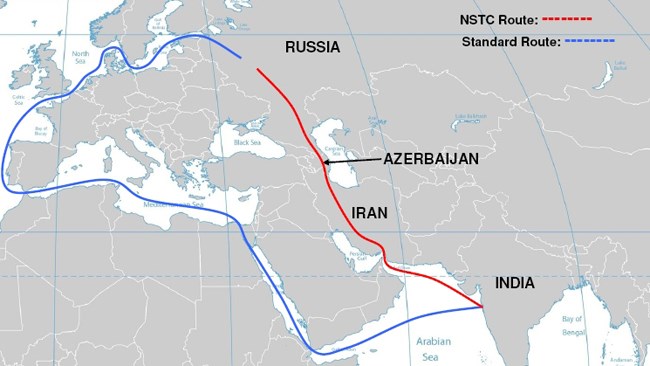
The corridor is expected to reduce transportation costs and time from Eurasia to the Persian Gulf countries and India by 30 percent.
Iran began the construction project of the Rasht-Astara railway in northern country last month which is considered as one of the final stages of completing a highly strategic International North-South Transit Corridor (INSTC).
Iran, Azerbaijan, Russia ink declaration on development of strategic corridor
A declaration on the development of the International North-South Transport Corridor (INSTC) was signed following the first Iran-Azerbaijan-Russia tripartite meeting in Baku on Friday, News.Az reports.
The document was inked by Azerbaijan’s Deputy Prime Minister Shahin Mustafayev, Russia’s Deputy Prime Minister Alexandr Novak and Iran’s Minister of Road and Urban Development Rostam Qassemi.
The sides stressed the importance of creating a working group to resolve the transport and transit issues and procedures through the territories of Azerbaijan, Russia and Iran amid the development of the North-South corridor and intend to hold the first meeting within a month.
Furthermore, countries intend to prepare a draft agreement on the Rasht-Astara railway project within a month, and a document that welcomes the involvement of Iran's Chabahar port in the corridor.
During the meeting, the parties talked about the work done on the sites of the represented country. They also exchanged views on further steps and proposed further mechanisms that will contribute to accelerating the development of the International North-South Transport Corridor.

The corridor is expected to reduce transportation costs and time from Eurasia to the Persian Gulf countries and India by 30 percent.
Iran began the construction project of the Rasht-Astara railway in northern country last month which is considered as one of the final stages of completing a highly strategic International North-South Transit Corridor (INSTC).

